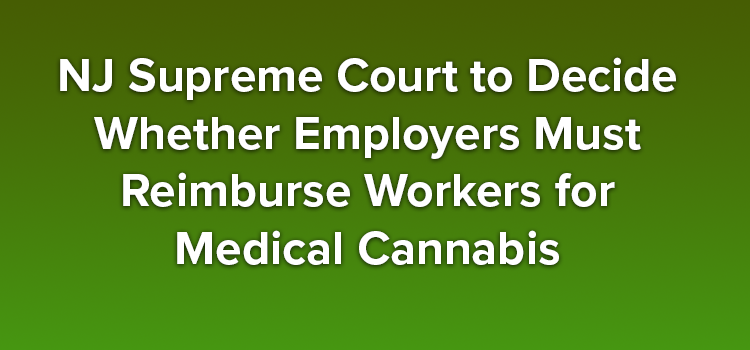
The Supreme Court of New Jersey recent heard oral arguments in Hager v. M&K Construction. The closely-watched case will determine whether an employer can be required to reimburse an employee for the cost of the employee’s medical marijuana.
Facts of Hager v. M&K Construction
In 2001, Vincent Hager (Hager), then 28 years old, was employed by M&K Construction (M&K) and working on a construction site, when a truck delivering concrete dumped its load onto him. Hagar underwent several surgeries; however, they were unsuccessful in alleviating his pain. After relying on opioids to treat his chronic pain, Hagar was prescribed medical marijuana under the New Jersey Compassionate Use Medical Marijuana Act (MMA).
After M&K’s denied his workers’ compensation claim, Hager filed suit. After several days of trial, M&K reached an agreement with Hager regarding medical bills, reimbursement for out-of-pocket medical expenses, temporary disability benefits, and third-party lien credits. The issues remaining for determination by the workers’ compensation judge were the award of permanent disability and future medical treatment. The judge ultimately found that Hager exhibited permanent partial total disability of 65% and ordered M&K to reimburse petitioner for the costs of medical marijuana and any related expenses.
In finding that M&K must reimburse Hager for his medical cannabis treatment, the workers’ compensation judge rejected the testimony of M&K’s expert that Hager should “simply deal with his pain.” According to the judge, this position was “unacceptable as inhumane and contrary to the law concerning an employer’s obligation to treat.” The judge further noted that “if the only choice for petitioner is between opioids and marijuana, then marijuana is the clearly indicated option.” She added: “Both modalities present significant downsides in terms of adverse consequences and risks, but a comparison leads inescapably to a conclusion that marijuana is the appropriate option.”
Appellate Division’s Decision in Hager v. M&K Construction
The Appellate Division held that a workers’ compensation judge can order an employer to reimburse its employee for the employee’s use of medical marijuana prescribed for chronic pain following a work-related accident. According to the appeals court, New Jersey employers do not violate federal law in reimbursing workers who have been prescribed medical cannabis.
“Because we conclude the [workers’ compensation] order does not require M&K to possess, manufacture or distribute marijuana, but only to reimburse petitioner for his purchase of medical marijuana, we discern no conflict between the CSA and MMA,” the panel said. “Furthermore, M&K’s compliance with the order does not establish the specific intent element of an aiding and abetting offense under federal law.”
The appeals court rejected M&K’s argument that the Controlled Substances Act (CSA) preempts the MMA because it is impossible to comply with both statutes. In reaching its decision, the panel emphasized that “Congress has expressed its intent in the plain language of the CSA that it only preempts a state law that requires the performance of an action specifically forbidden by the federal statute.” According to the panel, “The MMA does not require an employer to possess, manufacture or distribute marijuana – the actions proscribed by the CSA. Because it is not physically impossible to comply with the CSA and the MMA, there is no positive conflict between these laws.”
The Appellate Division also rejected M&K’s argument that the order violates the CSA because it requires the employer to aid and abet petitioner’s possession of an illegal substance. “Under the circumstances presented here, M&K is not an active participant in the commission of a crime,” the court wrote. “The employer would be complying with an order requiring it to reimburse a person for the legal use of medical marijuana under this state’s law.”
Issues Before the New Jersey Supreme Court
M&K appealed, and the New Jersey Supreme Court granted certification on May 12, 2020. The justices agreed to consider the following question: “Among other issues, may a workers’ compensation judge order an employer to reimburse its employee for the cost of the employee’s medical marijuana prescribed for chronic pain following a work-related accident?”
The court held oral arguments on December 1, 2020. The justices appeared poised to uphold the Appellate Division’s decision, with several justices questioning M&K’s argument that reimbursing a worker for medical cannabis use would run afoul of the CSA. Of course, we will have to await the court’s ruling.
